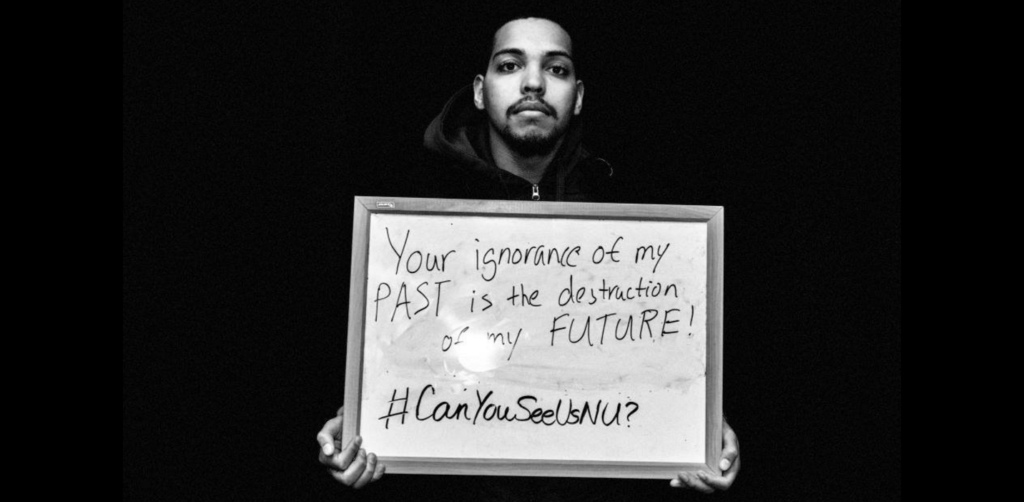By Alejandro Serrano, news correspondent
A new coalition of student groups, Students Against Institutionalized Discrimination (SAID), formed this month to call attention to institutional discrimination and to advocate for diversity training at freshman orientation.
Bringing together members of numerous on-campus student clubs, the coalition is striving to combat institutional discrimination at Northeastern University (NU) and in Boston, according to co-founder Chelsea Canedy, a third-year behavioral neuroscience major.
“As director of preconception peer education with the Health Disparities Student Collaborative (HDSC), my work focuses on infant mortality rate in the US. That rate is doubled for African-American women due to various factors,” Canedy said. “After looking at aspects aside from health, such as income and education, I noted that the disparity doesn’t go away. This was something we always acknowledged [in the Health Disparities Student Collaborative]. However, it wasn’t something that we tried to work on in the community even though we have the power. SAID was created, mostly to address…institutional [and] interpersonal…racism each individual faces at Northeastern.”
According to Integrated Postsecondary Education System Data, 3 percent of the NU student body is black or African-American, 7 percent is Hispanic/Latino, 11 percent is Asian and 49 percent is white. The other 30 percent are nonresident aliens, students who identify as two or more races and students whose race or ethnicity is unknown.
“NU in general is a white institution, but it reflects that there isn’t a deliberate effort to recruit and enroll minority students – be it students with a disability, of color or the LGBTQ community,” junior student services and international affairs major Michaela Anang said. “Those practices to us aren’t accurate. We hope to address this issue with the coalition.”
The coalition will meet on a bi-weekly basis, said Canedy.
“The first meeting went very well,” Canedy said. “[There were a] number of students representing numerous student groups. We want it to be as reflective of the student body as possible. We aren’t able to solve racism everywhere, but we are still able to affect what our peers learn and what our peers do, and that is something we all take very seriously.”
Student groups in the coalition include Students For Education Reform, Northeastern Black Student Association (NBSA), Feminist Student Organization (FSO), Sexual Health and Advocacy Resources and Education (SHARE), Progressive Student Alliance (PSA), Husky Environmental Action Team (HEAT), Students of Singapore (NUSS), Minority Association of Pre-med Students (MAPS) and Korean American Student Association (KASA).
The group was named Students Against Institutionalized Discrimination because, although the current campaign is centered on racism, leaders want to expand their focus further in the future.
“There are a number of marginalized groups on campus that each have their own unique struggle and hurdles to face,” Canedy said.
These hurdles are a common experience among marginalized groups, according to Patricia Illingworth, a Northeastern professor of philosophy and business.
“There is something called implicit bias which happens when individuals have a natural prejudice, unconsciously, against certain groups,” Illingworth said. “We have to find mechanisms in the institution [which is being dealt with] that will override those biases.”
The coalition’s first campaign involved the SAID Your Story Survey, which was sent to multiple cultural groups at Northeastern. The survey contained questions about the experience in every marginalized part of a person’s identity that members of the groups that participated in the survey had faced. The results are being used to see what kind of concerns students have, and also to see what students believe needs to be changed. The link to the survey was initially posted in early September, on the SAID Town Hall Meeting Facebook page.
One of SAID’s plans is to promote a freshman orientation program that would make students more culturally competent using diversity training, according to Canedy, who said the idea is still in its planning stages.
“Even without the representation of students of color … there is also a lack of information and education about these issues on campus,” Anang said. “We hope to promote diversity training with SAID.”
Right now, SAID claims to be organizing several other initiatives, but the group doesn’t have concrete plans.
Photo courtesy of The NBSA, Twitter









